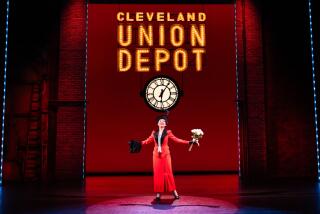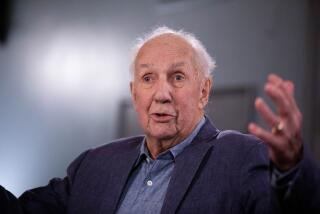Review: Beckett classic ‘Happy Days’ on superb ground at Boston Court
Logistically I know it’s impossible, but I could have sworn that Winnie, the determinedly cheery middle-aged woman who is planted in the earth up to her bosom in Samuel Beckett’s “Happy Days,” had been ahead of me at the checkout line the other day at Trader Joe’s.
The two of us cracked jokes about the parking situation, wondering whether we’d make it out alive with our bundles amid the frenzied assault of impatient drivers. Seeing me toss a bar of dark chocolate into my basket at the last minute, she turned to me with a smile and said, “It’s the little things that get us through,” before vanishing with a cart that seemed to be crammed almost entirely with gingersnaps and Charles Shaw wine.
Chalk this sighting up to the uncanny familiarity of Brooke Adams’ Winnie in Andrei Belgrader’s superb revival of “Happy Days,” now at the Theatre @ Boston Court. The unforced neighborliness of her performance allowed me to experience the play with new eyes — and spot the Winnies all around us.
This production — which features Broadway veteran and multiple Emmy winner Tony Shalhoub, Adams’ real-life husband, in the role of Willie, Winnie’s there-but-not-there life partner — preserves the universality of Beckett’s vivid stage metaphor while making it seem right at home in Southern California.
The mound of earth in which Winnie is immured could be any drought-ridden stretch of hillside off the freeway. The blazing sun, igniting Winnie’s parasol at one point, reminded me of my recent ill-fated journey to the Valley, where the sweltering temperature persuaded me to choose a less hellish day to shop for furniture.
Climate change has made the near-apocalyptic landscape of “Happy Days” seem prophetic. Takeshi Kata’s set design is true to Beckett’s vision in that the scene’s outlandish artificiality manages to convey the “heat and desiccation” that the author in a letter to director Alan Schneider took pains to emphasize.
Arriving at the proper balance between theatricality and realism is tricky with Beckett’s work. His plays construct universes that are like living installations. Yet as dramaturge and critic Jan Kott pointed out in his short essay “A Note on Beckett’s Realism,” “In a Beckett play, a wide generalization, the total and absolute human situation, always corresponds to a real, concrete individual situation.”
Winnie’s predicament may be preposterous, but there’s nothing contrived about Adams’ flesh and blood portrayal. This is in every sense a deeply rooted performance. The creasing of the skin on her arms and the way her cleavage bounces when she laughs remind us that at the center of this absurdist play is a mortal being and not merely a theatrical conceit.
Adams adopts a tone that neither pushes the comedy nor the tragedy. Some performers, out of fear of losing the audience during the slightly overlong first act, affect a lively, quasi-vamping style. Adams takes her time, making Beckett’s mix of poetic quotation, humorous cliché and fractured anecdote her own.
I’ll admit that there were moments in the first half when I wondered whether the balance had tilted too far toward naturalism. When Adams’ Winnie brushes her teeth, she doesn’t miss a tooth; she even makes sure to polish the backs of her lower front. Each item that is removed from her bag — the magnifying glass, the music box, the gun — is treated as though it were a visit from a friend. This is what Beckett intended, but the pacing could be quickened without sacrificing truthfulness.
In the second act, when Winnie is buried up to her neck, small things draw our attention — the way spittle accumulates at the corner of Adams’ mouth or the way her eyelids appear to be sorrowfully singed by the sun. Her physical presence grows in eloquence as her movement becomes even more restricted. There’s no distancing oneself from this fellow baffled traveler going nowhere but down.
On those fleeting occasions when he crawls out of his nearby hole, Shalhoub’s Willie plays up the farce of bodily decrepitude, one of Beckett’s comic specialties. He wiggles and groans and makes ghastly noises of exertion. Blowing his nose substitutes for conversation; he offers salutation by mooning. When he does reply to Winnie, who derives joy from the simple reassurance that he’s near and not yet comatose, the few words he manages seem to sap him of all his strength.
Winnie, like all of us, is being buried alive by time. But while she has her Willie semi-sentient by her side, it is another happy day.
This richly inhabited production, suffused with the tender solace of human connection in the existential void, gives us a less ironic reason to rejoice: Beckett, not a writer one would imagine being terribly at home in Southern California, has found congenial ground in Pasadena.
Twitter: @charlesmcnulty
------------
‘Happy Days’
Where: Boston Court Performing Arts Center, 70 N. Mentor Ave., Pasadena
When: 8 p.m. Thursdays-Saturdays, 2 p.m. Sundays. Ends Oct.12
Tickets: $34
Info: (626) 683-6883, www.bostoncourt.com
Running time: 2 hours 15 minutes
More to Read
The biggest entertainment stories
Get our big stories about Hollywood, film, television, music, arts, culture and more right in your inbox as soon as they publish.
You may occasionally receive promotional content from the Los Angeles Times.







